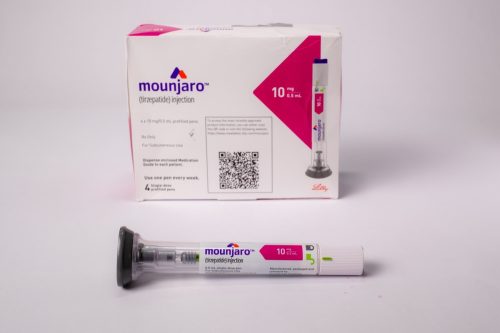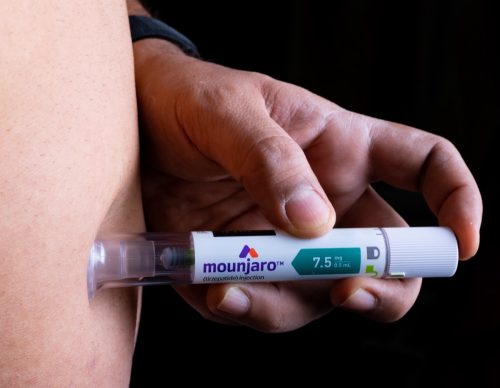New Drug Has People Losing 60 Pounds on Average, Research Shows—And It’s Not Ozempic

New diabetes and weight loss drugs on the market have helped change the lives of many looking to shed pounds. Ozempic and Wegovy (semaglutide), both made by Novo Nordisk, are two of the most well-known names, but they’re not the only ones available. Mounjaro (tirzepatide), another treatment currently approved for type 2 diabetes, is an option made by Eli Lilly and Company—and a new study found that it can have dramatic results. Read on to find out how the drug helped patients lose 60 pounds on average.
RELATED: Ozempic Patient Reveals “Excruciating” New Side Effect.
The study evaluated its effectiveness for weight loss.

In an Oct. 15 press release, Eli Lilly announced the results from the phase 3 SURMOUNT-3 clinical trial, which studied the use of Mounjaro in patients with obesity and those who were overweight with weight-related comorbidities. While the drug is currently approved for diabetes, the trial excluded these patients and focused on off-label use for weight loss.
According to study results published in Nature Medicine, patients were divided into two groups, one receiving Mounjaro and another receiving a placebo injection, for 16 months. The study started with 800 patients, but after a three-month “lead-in period”—which involved diet, exercise, and counseling sessions—over 200 people dropped out for a range of reasons (including not losing enough weight).
RELATED: Ozempic Patients Report Debilitating New Side Effect: “Wish I Never Touched It.”
Those on Mounjaro saw better weight loss results.

When the study began, patients weighed an average of 241 pounds, and by the end of the 12-week diet and exercise period, participants were down an average of 16.8 pounds, or roughly 7 percent. In the period after the lead-in, those on Mounjaro lost another 21 percent of their body weight.
In total, from the study entry to completion at 84 weeks, patients on Mounjaro lost a total of 26.6 percent of their body weight, which equated to 64.4 pounds. Those taking the placebo only lost 3.8 percent of their body weight, or nine pounds, from start to finish.
“In this study, people who added tirzepatide to diet and exercise saw greater, longer-lasting weight reduction than those taking placebo,” Jeff Emmick, MD, PhD, senior vice president of product development at Eli Lilly, said in the press release. “While intensive lifestyle intervention is an important part of obesity management, these results underscore the difficulty some people face maintaining weight loss with diet and exercise alone.”
RELATED: 4 Foods That Spike the Same Weight Loss Hormone as Ozempic, Experts Say.
The results were also better than those seen with semaglutide.

Roughly 88 percent of people taking Mounjaro also lost 5 percent or more of their body weight during the study, compared with just 17 percent of those taking the placebo. In addition, 29 percent of those receiving treatment lost a whopping quarter of their body weight—compared with just 1 percent of patients in the placebo group.
As Caroline Apovian, MD, a doctor who treats obesity at Brigham and Women’s Hospital in Boston, told the Associated Press (AP), these numbers are better than those seen for semaglutide and comparable to results achieved through surgery.
“We’re doing a medical gastric bypass,” said Apovian, who was not involved in the study, adding, “Any way you slice it, it’s a quarter of your total body weight.”
According to AP, like Ozempic, Mounjaro is currently prescribed off-label for obesity treatment. However, it’s different from Ozempic and Wegovy because it targets two hormones to regulate appetite and the feeling of being “full.” The other two drugs only target one hormone.
RELATED: FDA Issues Ozempic Update After Users Cite “Severe” Gastrointestinal Issues.
There were some side effects.

As with most drugs, there were some side effects reported in the Mounjaro study. The most commonly reported issues were gastrointestinal-related, ranging from mild to moderate severity.
Patients in both groups reported nausea, diarrhea, constipation, and vomiting, and COVID-19. More patients on Moujaro reported GI issues, while slightly more people taking the placebo reported COVID-19. These adverse events led 10.5 percent of patients taking Mounjaro to drop out of the study, compared with 2.1 percent of those taking the placebo.
Best Life offers the most up-to-date information from top experts, new research, and health agencies, but our content is not meant to be a substitute for professional guidance. When it comes to the medication you’re taking or any other health questions you have, always consult your healthcare provider directly.
RELATED: For more up-to-date information, sign up for our daily newsletter.